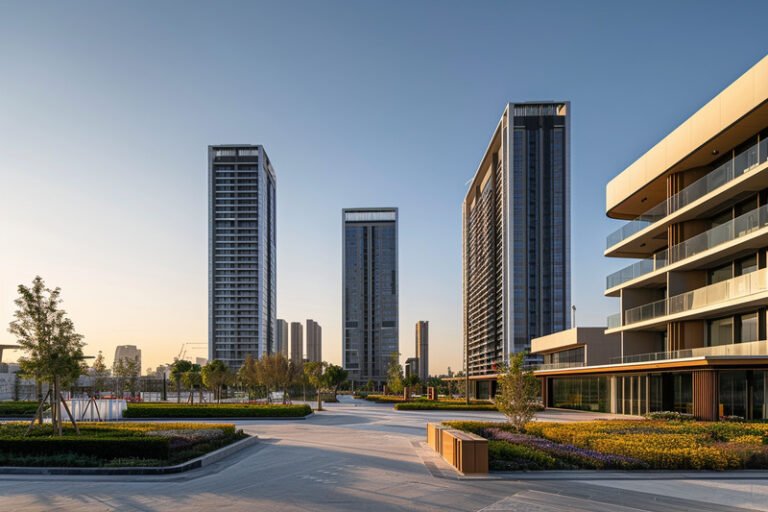Step-By-Step Guide to Purchasing Property in Dubai

To buy property in Dubai, confirm your eligibility for designated areas and prepare documents like your passport and NOC. Choose a preferred location and set a budget, including registration fees.
Research property types, from apartments to villas, and find a reliable real estate agent through recommendations and RERA verification. Inspect properties thoroughly, possibly with professional help, and compare lenders for financing options.
Finally, sign the Sale and Purchase Agreement, pay the deposit, and complete paperwork at the Dubai Land Department. For more details on each step, further exploration is encouraged.
Understand Legal Requirements
Before purchasing property in Dubai, you need to understand the local legal requirements to ensure a smooth transaction. Here are the steps involved:
Let us help you find the perfect property. Contact us to get started.
- Confirm that you’re eligible to buy property.Non-UAE nationals can purchase freehold properties only in specific designated areas.
- Ensure you have:
- Valid passport.
- No-Objection Certificate (NOC) from the developer.
- Proof of finance (mortgage pre-approval or proof of funds if paying in cash).
- Be prepared to submit copies of these documents during various stages of the process.
- Understand the role of the DLD, which oversees all real estate transactions.
- Pay a registration fee, usually 4% of the property value, to the DLD.
- Also, you should be aware of the Oqood system, which registers off-plan property sales.
Considerations for Indian Investors
For Indian investors looking to purchase property in Dubai, there are additional factors to consider.
Dubai’s real estate market offers attractive opportunities due to its tax-free environment, high rental yields, and potential for capital appreciation. However, it’s important to be aware of the regulations set by the Reserve Bank of India (RBI) regarding overseas investments.
According to the Liberalized Remittance Scheme (LRS), Indian residents can remit up to $250,000 per financial year for the purchase of property abroad.
Ensure you comply with these limits and consult with a financial advisor to navigate the complexities of cross-border transactions. Additionally, staying updated on currency exchange rates and understanding their impact on your investment is crucial for maximizing returns.
Choose the Right Location
After understanding the legal requirements, it’s time to choose the right location for your property in Dubai. This decision is vital as it impacts not only your lifestyle but also the future value of your investment. Dubai offers a diverse range of neighborhoods, each with its own unique characteristics.
- First, consider what type of environment suits your needs. If you prefer a bustling urban setting, Downtown Dubai and Business Bay might be ideal. These areas are close to major attractions like the Burj Khalifa and Dubai Mall, offering a vibrant city life.
- If you desire a more relaxed atmosphere, areas like Arabian Ranches and The Springs offer tranquil residential communities with plenty of green spaces.
- Next, evaluate the proximity to essential amenities. Look for locations that are near schools, hospitals, shopping centers, and public transportation. For instance, areas like Jumeirah and Al Barsha are well-equipped with these facilities, making daily life more convenient.
- Additionally, consider future development plans. Areas like Dubai South and Dubai Creek Harbour are rapidly developing, potentially offering high returns on investment.
Set a Budget
Setting a budget is important because it defines the scope of your property search and guarantees you don’t overextend financially. By establishing a clear budget, you make sure that your property purchase aligns with your financial capacity and long-term goals.
- Start by evaluating your current financial situation, including your savings, monthly income, and existing debts. This will help you determine how much you can afford as a down payment and what your monthly mortgage payments should be.
- Next, consider additional costs such as registration fees, agent commissions, and maintenance expenses. These can add up quickly, so it’s crucial to factor them into your budget.
- You should also account for potential fluctuations in property values and interest rates, which could impact your financial obligations over time.
- Consult with a financial advisor or mortgage broker to get a realistic picture of your borrowing capacity. They can provide insights into different financing options and help you choose one that best suits your needs.
Research Property Types
Understanding the various property types available in Dubai is crucial for making an informed decision. You’ll find a diverse range of options, each serving different needs and preferences. The primary categories include apartments, villas, townhouses, and commercial properties.
Apartments
Apartments are very popular, especially in high-rise buildings located in bustling areas like Dubai Marina and Downtown Dubai. They range from studios to multiple-bedroom units, catering to singles, couples, and families.
Villas
Villas offer more space and privacy, often situated in suburban areas such as Arabian Ranches and Palm Jumeirah. They typically come with gardens and sometimes even private pools, making them ideal for families seeking a more tranquil environment.
Townhouses
Townhouses, a blend of apartments and villas, offer a balance of space and community living. Areas like Jumeirah Village Circle often feature these properties, appealing to those wanting a mix of urban and suburban benefits.
Find a Real Estate Agent
Finding the right real estate agent in Dubai can greatly simplify your property purchasing process. An experienced agent will have in-depth knowledge of Dubai’s real estate market, helping you navigate through the various options and legal requirements.
- Begin your search by seeking recommendations from friends, family, or colleagues who’ve previously purchased property in Dubai. Personal referrals often lead to trustworthy agents who’ve a proven track record.
- Additionally, you can explore online real estate platforms and forums where agents are reviewed and rated by clients. Look for agents who specialize in the type of property you’re interested in, whether it’s residential, commercial, or investment properties.
- Check their credentials and make sure they’re registered with the Real Estate Regulatory Agency (RERA), which is a vital step in verifying their legitimacy.
- Once you have a shortlist of potential agents, schedule interviews to discuss your needs and gauge their expertise. Ask about their experience, recent transactions, and familiarity with the areas you’re targeting. A good agent should offer insights and advice tailored to your specific requirements.
- Trust and communication are key; choose someone who listens to you and provides clear, honest answers. This will ensure a smooth and efficient property purchasing experience.
Conduct Property Inspections
After choosing a dependable real estate agent, the next step is to conduct extensive property inspections to guarantee you’re making a solid investment.
- Begin by scheduling visits to the properties that meet your criteria. During these visits, pay close attention to the property’s condition.
- Look for signs of wear and tear, such as cracks in the walls, dampness, and the state of fixtures and fittings. Confirm all electrical and plumbing systems are functioning properly.
- It’s advisable to take notes and photographs during each inspection. This will help you compare properties later. Don’t hesitate to ask the agent or property owner detailed questions about the property’s history, any renovations, and the age of major systems like the HVAC and roof.
- Furthermore, consider the property’s location. Evaluate the neighborhood for amenities such as schools, hospitals, and public transportation. Assess the security of the area and the overall environment.
- Hiring a professional inspector can provide a more thorough evaluation. They can identify potential issues that may not be immediately visible. Their report will offer an impartial assessment, helping you make an informed decision.
Secure Financing
Securing financing for your Dubai property purchase is an important step that requires careful planning and consideration.
- First, assess your financial situation to determine how much you can afford. Calculate your monthly income, expenses, and existing debts to make sure you can manage a mortgage comfortably. It’s crucial to have a clear picture of your financial health before proceeding.
- Next, research mortgage options available in Dubai. Many local and international banks offer mortgage services for property buyers. Compare interest rates, loan terms, and eligibility criteria. Keep in mind that some banks have specific requirements for expatriates, such as minimum salary thresholds and employment verification.
- Once you’ve identified potential lenders, gather the necessary documentation. Typically, you’ll need your passport, visa, Emirates ID, bank statements, salary certificates, and proof of address. Having these documents ready will expedite the application process.
- After submitting your application, the bank will conduct a thorough review of your financial status. If approved, you’ll receive a pre-approval letter outlining the loan amount and terms. This letter not only strengthens your position as a buyer but also helps you set a realistic budget.
With financing secured, you’re now ready to move forward with your property purchase in Dubai.
Complete the Purchase Process
With your financing in place, it’s time to finalize your property purchase in Dubai.
- First, sign the Sale and Purchase Agreement (SPA) with the seller.
- This document outlines the terms and conditions of the sale, including the agreed price, payment schedule, and handover date. Make sure to read it carefully and understand every clause before signing.
- Next, you need to pay the initial deposit, which is typically 10% of the property’s value. This deposit secures your commitment to the purchase.
- Following this, schedule a meeting with the Dubai Land Department (DLD) to transfer ownership. Both you and the seller must be present, along with your respective agents.
- At the DLD, you’ll complete the necessary paperwork and pay the transfer fee, usually around 4% of the property’s value. Additionally, you may need to pay administrative fees and any outstanding service charges.
- After the paperwork is processed, you’ll receive a new title deed in your name, officially making you the owner.
Conclusion
By following these steps, you’ll navigate the property purchasing process in Dubai with confidence. Understand the legal requirements, choose the right location, and set a realistic budget.
Research various property types and enlist a reliable real estate agent. Conduct thorough property inspections and secure necessary financing.
Finally, complete the purchase process meticulously. With careful planning and due diligence, you’ll make a well-informed investment in Dubai’s real estate market.
Let us help you find the perfect property. Contact us to get started.






